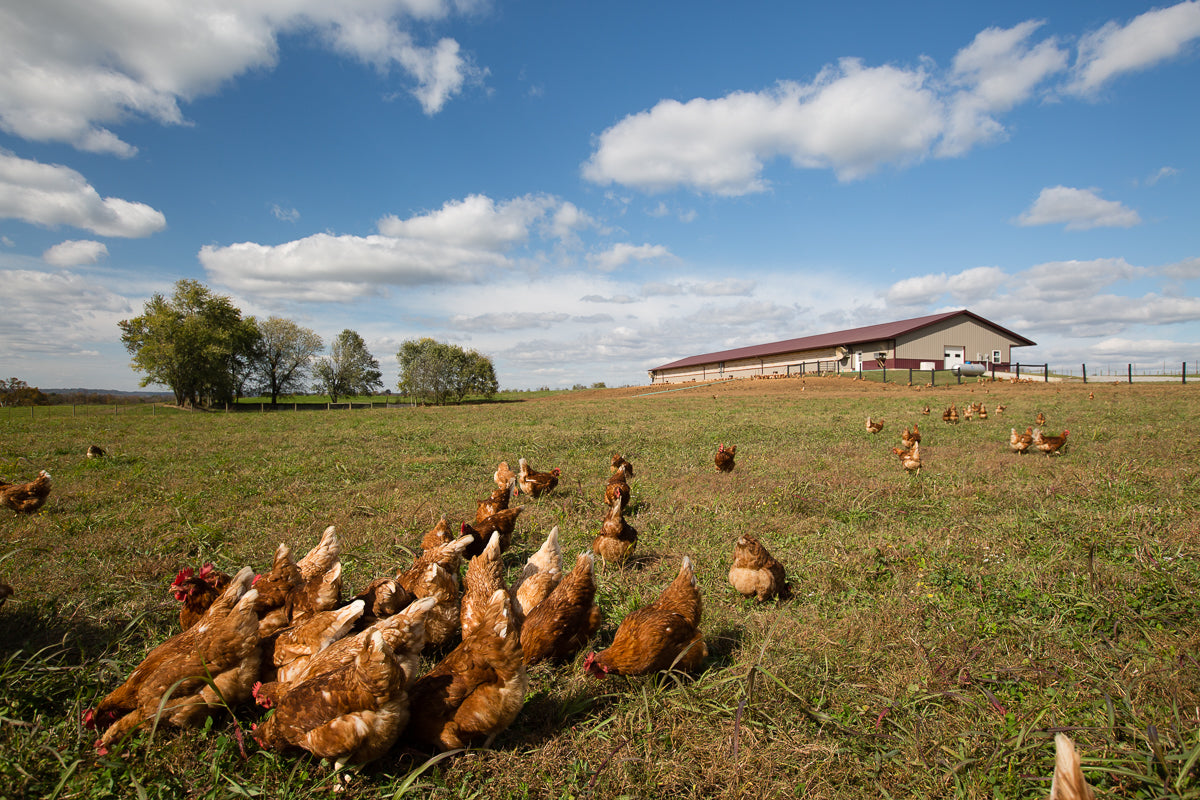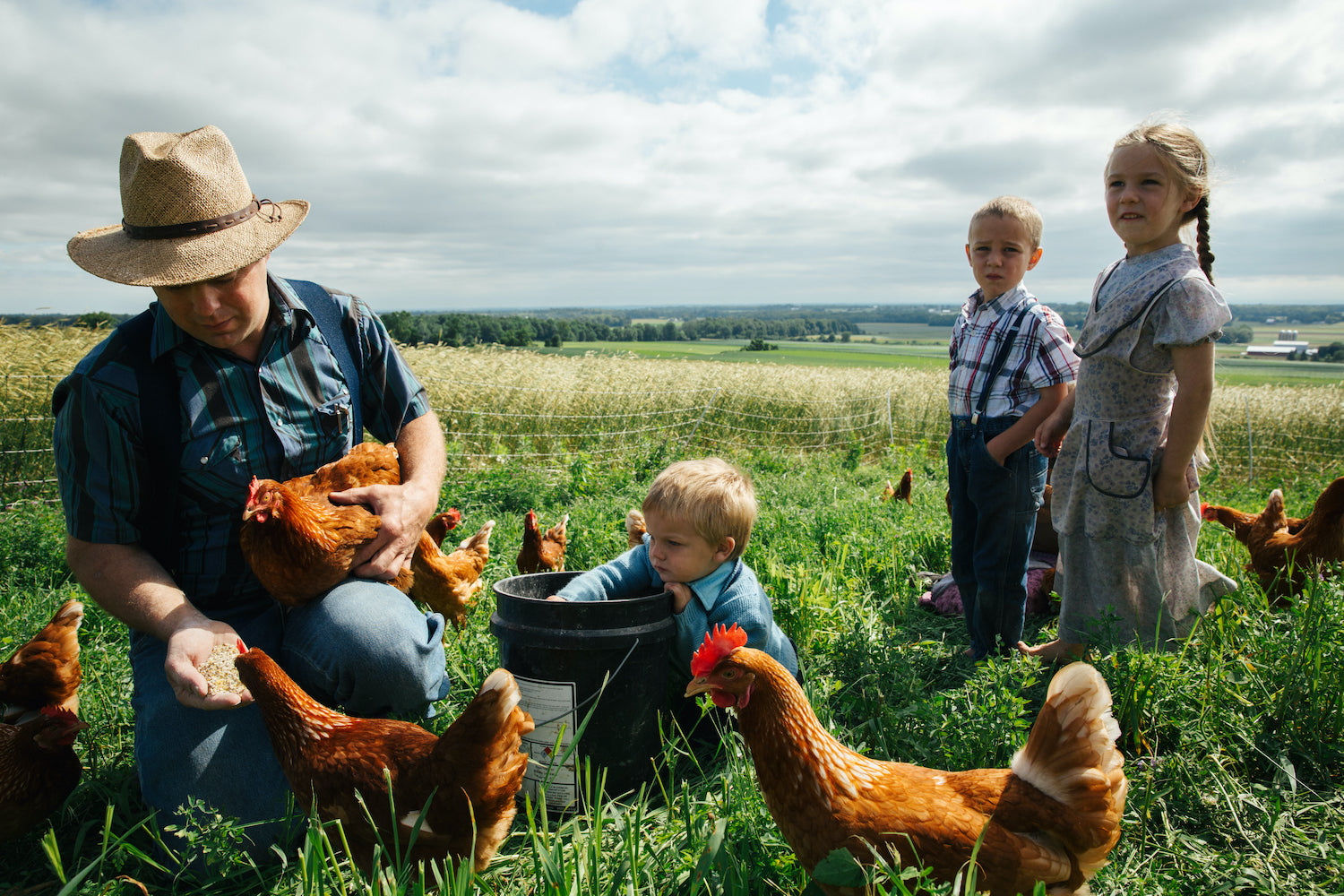What Are Pasture Raised Eggs?

What Are Pasture Raised Eggs?
Pasture raised eggs come from hens that are raised on actual pasture – not confined in barns or cages. Hens have access to hills, woodlands and plenty of shade and water. At Handsome Brook, our hens are American Humane certified to have 108.9 or more square feet of pasture each. That’s a lot of space – 54x more space than most “free range” hens enjoy. It means they get to roam, forage and flap like real chickens which makes for a happy, stress free hen – and that makes for a better egg.

[Pasture Raised Hens]
Pasture Raised Means Better Quality of Life
Hens weren’t meant to live 350,000 to a “cage-free” barn with a small pop hole. Even “free range”- which often requires only 2 square feet of average space – is not enough for a decent sized flock to roam. Hens need room to behave like chickens in a non-competitive environment and have room to forage for shoots, leaves and bugs. Hens need space.
Ample pasture allows hens to forage a much larger piece of land. It is critical that hens can wander well away from the barn to reach fresh, frequently rotated pasture land where they can find the vegetation and insect life they love. Heavily trafficked land around the barn gets worn down and loses its vegetation and, as a result, its insect life too. On the pasture, our hens have access to shade, shelter and water to keep them safe and healthy. The extra space for our certified pasture raised hens allows them to lead a much more pleasant, normal, stress free and happy life doing chicken stuff. You know, eating bugs.
The care we take for our hens also translates to our barns. We insure that our hens have ample roosting space, access to supplemental feed, clean air and fresh water. Why? Because sometimes our hens feel like hanging out at home (don’t you?). We want that home to be as comfortable as possible. Our small family farmers walk the barns multiple times a day to make sure our hens are getting out, getting health care, and growing and maturing appropriately. It is part of our commitment to an overall better lifestyle, in the barn and out.
We make sure our farms meet exacting standards for welfare, environment and nutrition. In fact, we are so focused on our girls, we go above and beyond in animal health and welfare. Below is a just a little bit of our standards and what we require.

Pasture Raised Means Better Taste & Nutrition
Better Taste From Pasture Raised Eggs
A hen’s improved life not only benefits her – it benefits us too. At Handsome Brook Farm, we believe that treating animals well allows them to produce better products for us, whether that product is eggs or milk or even bacon. In our case, this means rich, creamy egg yolks with an orange hue and firm egg whites that support the yolk. It’s a difference you can taste – and one of the main reasons this company started.
Why are better tasting eggs important? Ask a chef. The first thing she’ll tell you is that the ingredients you use are the most important determinant of the quality of the final dish. Eggs are a pretty important ingredient. Not only do they show up in your scrambles, omelets and quiches, but they also appear in your healthy grain bowls, carbonaras and Caesars, and in your cakes and custards. Better eggs make everything else better (even if it’s just sunny side up on toast).
Better Nutrition from Pasture Raised Eggs
Pasture raised eggs also mean better nutrition. In recent study by Penn State University and in an earlier study by Mother Earth News, pasture raised eggs were shown to be higher in Omega 3s, Vitamin A and Vitamin E than conventional eggs. Omega 3s support heart health, while Vitamins A and E support brain and eye functions, respectively. It turns out that pasture raised eggs are not just better tasting, they’re better for you too.
Omega 3s: Pastured eggs have been shown to have 2X the Omega 3s of a conventional egg – without having it artificially added to their feed (which is how most “Omega 3” eggs achieve this quality). Omega 3 fatty acids have been shown to be critical to improved heart health, and lower risks of everything from depression to arthritis. Plus, your body does not make them on its own – they must be consumed through food or supplements.
Vitamin A: Pastured eggs have been shown to have 35% more Vitamin A than conventional eggs. Vitamin A, also known as retinol, is critical to vision, and maintains the health of specialized tissues in the eye (think the retina…). It also aids in the growth of healthy skin and muscle tissue. Retinol is found in animal product like eggs, unlike it counterpart beta-carotene which is found in plants and vegetables.
Vitamin E: Pastured eggs have been shown to have 23% more Vitamin E than conventional eggs. Vitamin E is a strong anti-oxidant, protecting cells from damage caused by free radicals. Diseases thought to be partially caused by free radical damage include cardiovascular disease and cancer. Vitamin E has also been shown to improve brain and eye health.
There you have it: taking better care of our hens allows them to take better care of us.
Check out our next post for more info on organic eggs!
Sources: WebMD.com, MedlinePlus.gov, NIH.gov



